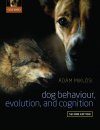![Dog Behaviour, Evolution, and Cognition Dog Behaviour, Evolution, and Cognition]()
Click to have a closer look
About this book
Contents
Customer reviews
Related titles
About this book
This is the first book to collate and synthesize the recent burgeoning primary research literature on dog behaviour, evolution, and cognition. The author presents a new ecological approach to the understanding of dog behaviour, demonstrating how dogs can be the subject of rigorous and productive scientific study without the need to confine them to a laboratory environment.
This second, fully updated edition of Dog Behaviour, Evolution, and Cognition starts with an overview of the conceptual and methodological issues associated with the study of the dog, followed by a brief description of their role in human society. An evolutionary perspective is then introduced with a summary of current research into the process of domestication. The central part of Dog Behaviour, Evolution, and Cognition is devoted to issues relating to the cognitive aspects of behaviour which have received particular attention in recent years from both psychologists and ethologists. Dog Behaviour, Evolution, and Cognition's final chapters introduce the reader to many novel approaches to dog behaviour, set in the context of behavioural development and genetics. This second edition recognises and discusses the fact that dogs are increasingly being used as model organisms for studying aspects of human biology, such as genetic diseases and ageing. Specific attention is also given in this edition to attachment behaviour which emerges between humans and dogs, the importance of inter-specific communication in the success of dogs in human communities and the broad aspects of social cognition and how this may contribute to human-dog cooperation
Directions for future research are highlighted throughout the text which also incorporates links to human and primate research by drawing on homologies and analogies in both evolution and behaviour. Dog Behaviour, Evolution, and Cognition will therefore be of relevance and use to anyone with an interest in behavioural ecology including graduate students of animal behaviour and cognition, as well as a more general audience of dog enthusiasts, biologists, psychologists, veterinarians, and sociologists.
Contents
1: Dogs in historical perspective
2: Concepts in the study of dog behaviour
3: Methodological issues in the behavioural study of the dog
4: Dogs in anthropogenic environments: family and society
5: Comparative overview of Canis
6: The story of domestication: Archaeological and phylogenetic evidence
7: The emergence of phenotypic novelty
8: Intra-specific social organization in dogs and related forms
9: The perceptual world of the dog
10: Physical-ecological problem solving
11: Affiliative and agonistic social relationships
12: Communication, play and collaboration
13: Social learning and social problem solving
14: Change of behaviour in time: From birth to death
15: The organisation of individual behaviour
16: The genetic contribution to behaviour
Customer Reviews
By: Ádám Miklósi(Author)
377 pages, b/w photos, b/w illustrations, tables
Reviews of the first edition:
" [...] both honest and representative of current thinking on the origins and importance of canine ethology."
– Claire L. Corridan, Anthrozoös
"Ádám Miklósi's new book [...] will be a landmark contribution to the study of animal behaviour, evolution and cognition."
– Current Biology
"Ádám Miklósi provides one of the first entirely research-based dog behaviour texts: a great achievement and most certainly a timely addition to the literature [...] Dog Behaviour, Evolution and Cognition is a very scholarly work, and an ideal starting point for any new researcher in the field of dog behaviour [...] The book's organization breaks convention and challenges the construct of dog behaviour that I, and no doubt others, have long accepted [...] this book represents an important step in the field of science-led dog research, and is a highly recommended addition to the bookshelf of any scholar of dog behaviour, domestication or animal cognition."
– Nicola Rooney, Animal Behaviour
"This book is distinct in its approach to canine behaviour from a convergent evolutionary viewpoint, thus it is not directly comparable to any other book on canine behavior and fills a unique need in the field of bahavioral science."
– Doody's Notes
"This new book is a testament to the bright future of research on dogs"
– Current Biology
"Miklósi's new book will be a central fixture in all future work on dogs, as it will be the first place that students and experts alike will go to review unfamiliar topics or search for new research ideas"
– Current Biology
"The 'must-reads' at the end of each chapter are a valuable guide to the literature, should the reader want to learn more. What makes this book especially valuable is that Miklósi reviews not only the very recent, but also the less recent literature."
– Trends in Cognitive Science




































